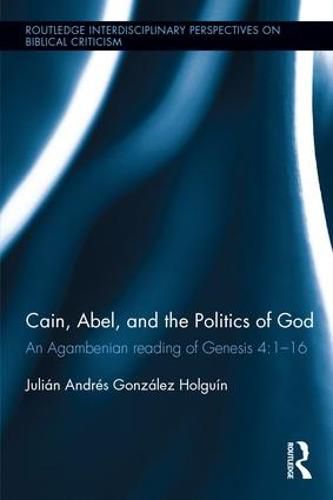Readings Newsletter
Become a Readings Member to make your shopping experience even easier.
Sign in or sign up for free!
You’re not far away from qualifying for FREE standard shipping within Australia
You’ve qualified for FREE standard shipping within Australia
The cart is loading…






The Genesis story of Cain’s murder of Abel is often told as a simplistic contrast between the innocence of Abel and the evil of Cain. This book subverts that reading of the Biblical text by utilising Giorgio Agamben’s concepts of homo sacer, the state of exception and the idea of sovereignty to re-examine this well-known tale of fratricide and bring to the fore its political implications.
Drawing from political theory, philosophy, and psychoanalysis, this book creates a theoretical framework from which to do two things: firstly, to describe and analyse the history of interpretation of Genesis 4:1-16, and secondly to propose an alternative reading of the Biblical text that incorporates other texts inside and outside of the Biblical canon. This intertextual analysis will highlight the motives of violence, law, divine rule, and the rejected as they emerge in different contexts and will evaluate them in an Agambenian framework.
The unique approach of this book makes it vital reading for any academic with interests in Biblical Studies and Theology and their interactions with politics and ethics.
$9.00 standard shipping within Australia
FREE standard shipping within Australia for orders over $100.00
Express & International shipping calculated at checkout
The Genesis story of Cain’s murder of Abel is often told as a simplistic contrast between the innocence of Abel and the evil of Cain. This book subverts that reading of the Biblical text by utilising Giorgio Agamben’s concepts of homo sacer, the state of exception and the idea of sovereignty to re-examine this well-known tale of fratricide and bring to the fore its political implications.
Drawing from political theory, philosophy, and psychoanalysis, this book creates a theoretical framework from which to do two things: firstly, to describe and analyse the history of interpretation of Genesis 4:1-16, and secondly to propose an alternative reading of the Biblical text that incorporates other texts inside and outside of the Biblical canon. This intertextual analysis will highlight the motives of violence, law, divine rule, and the rejected as they emerge in different contexts and will evaluate them in an Agambenian framework.
The unique approach of this book makes it vital reading for any academic with interests in Biblical Studies and Theology and their interactions with politics and ethics.